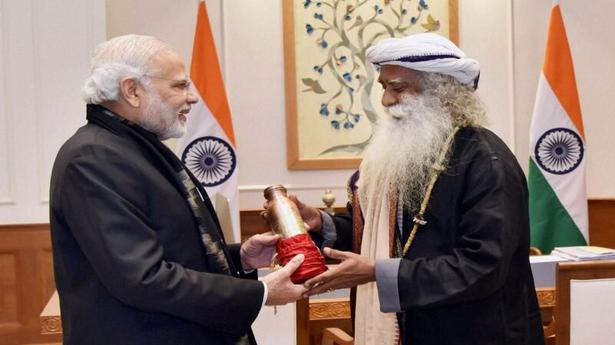
PM Modi, Jaggi Vasudev discuss soil conservation
The Hindu
They shared a podium on World Environment Day to mark 75 days of an ongoing world tour by Jaggi Vasudev to increase awareness on rejuvenating soil health.
Prime Minister Narendra Modi and spiritual Guru, Jaggi Vasudev shared a podium here on World Environment Day to mark 75 days of an ongoing world tour by the latter to increase awareness on rejuvenating soil health.
The ‘Save Soil Movement’ promoted by the Isha Foundation founder is a campaign on deteriorating soil health. Mr. Vasudev went about this by embarking on a 100-day motorcycle trip that began in March 2022, and visiting 27 countries. June 5 marks the 75th day of the 100-day journey.
He said that the movement was not about allocating large financial resources, and aimed to "raise consciousness" about the precarious soil health. Since Independence, India had worked to improve food security and though successful, caused soil quality to deteriorate.
Mr. Modi, while crediting his government with issuing soil health cards, that farmers could use to better plan their agricultural activities, said that to save the soil, focus was necessary on five things: how to make the soil chemical free, how to save the organisms that live in the soil, or soil organic matter, how to maintain soil moisture, how to increase the availability of water to till it, how to remove the damage that is happening to the soil due to less groundwater and finally, how to stop the continuous erosion of soil due to the reduction of forests.
Major efforts were being undertaken in the agriculture sector to alleviate the problem of soil issues. "Earlier, the farmers of our country lacked information about the type of soil, deficiency in soil, how much water is there. To overcome this problem, a huge campaign was launched to give soil health cards to the farmers in the country," the Prime Minister said.
Mr. Modi said that natural farming contained “a big solution” to some of our biggest problems. In the latest Budget, the government had decided to encourage natural farming in the villages situated on the banks of Ganga which would make it a huge corridor of natural farming. “This will not only make our farms chemical free but the ‘Namami Gange’ campaign will also gain new strength.” He added that India was working on the goal of restoring 26 million hectare land by 2030.













